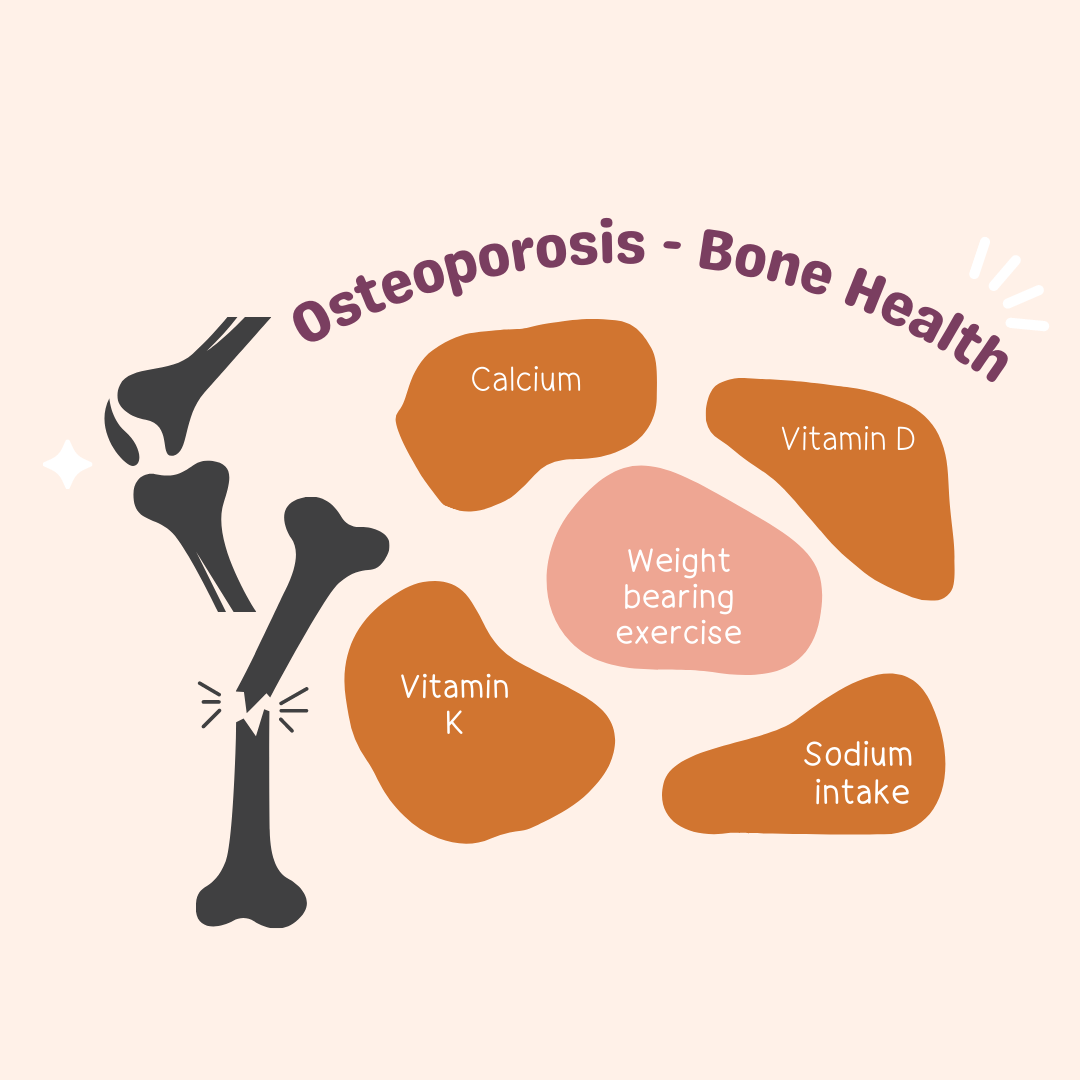This coming Thursday is World Osteoporosis Day.
If you aren’t already aware, osteoporosis causes bones to become weak and fragile. This, in turn means they are at risk of easily being broken.
This is such an important campaign because osteoporosis can be prevented if the right action is taken early enough.
In this article I am discussing some dietary and lifestyle practices to support bone health!
Dietary Prevention of Osteoporosis
First and foremost, adequate calcium is important to support bone health. Whilst dairy may instantly spring to mind when we think of calcium, if you are plant-based or simply don’t consume much dairy, there are many non-dairy calcium sources, including:
| Non-dairy Sources of Calcium | |
| Food | Milligrams of calcium (per 100g) |
| Salmon (canned) | 430 |
| Unhulled sesame seeds (tahini) | 352 |
| Tofu (fermented) | 330 |
| Linseeds | 220 |
| Almonds | 220 |
| Blackstrap molasses | 205 |
| Sunflower Seeds | 200 |
| Figs, dried | 200 |
| Parsley | 190 |
| Soy beans (dried) | 180 |
| Brazil nuts | 150 |
| Soymilk | 116 |
| Bok Choy, cooked | 86 |
| Seaweed, nori | 60 |
| Spinach | 58 |
| Oatmeal | 45 |
| Broccoli, cooked | 41 |
| Dairy sources of calcium (by way of comparison) | |
| Natural yoghurt | 211mg (per 100g) |
| Cow’s milk | 103mg (per 100g) |
| Feta cheese | 325mg (per 100g) |
Eat more insoluble fibre
Eating enough fibre allows for production of short-chain fatty acid Butyrate; Butyrate helps the body assimilate calcium and magnesium, necessary for our body to be able to use the calcium we consume. Beneficial sources of insoluble fibre include wheat bran, rice bran, fruit, vegetables, legumes, nuts and seeds.
Focus on Magnesium
Magnesium is calcium’s partner in crime when it comes to bone health; adequate levels of magnesium have been shown to assist with bone density and to maintain bone integrity. Good sources of magnesium include: leafy greens, nuts and seeds, fish, avocado and banana.
Add a handful of leafy greens to each meal daily
Leafy greens are a powerful package when it comes to bone health. They are a rich source of calcium, vitamin K and boron; all needed to accelerate bone and cartilage healing, improve rate of bone growth and bone mineralisation. Try incorporating a handful of leafy greens into the meals you cook, stir into casseroles, lightly steam with vegetables or toss into salads.
In terms of what not to do:
Consume excess sodium: high sodium intake can affect calcium excretion; avoid going over 2,300mg of sodium (one teaspoon) daily; an easy way is to reduce the amount of packaged foods purchased and opting for wholefoods.
Low protein diets: lack of dietary protein can impact on calcium absorption; always include a source of protein at each meal and snack, eggs, fish, meat, legumes, tofu, milk or cheese.
High phosphate diets: Avoid soft drinks high in phosphates, try soda water with fresh fruit as an alternative.
What other factors can affect bone health?
Stress less
The hormone cortisol is released in times of stress and if produced in excess can break down bones. Make sure to consume protein at each meal and snack to keep blood sugar in check and schedule time out to relax and rejuvenate.
Get some sun rays
Vitamin D is needed to assist with calcium absorption and the use of calcium within the body. To keep Vitamin D levels stocked up make sure to get safe sun exposure and/or supplement with Vitamin D. If you do not go out in the sun often or work indoors, make sure to get your Vitamin D levels tested via blood test on an annual basis.
Regular exercise
Bone is a living tissue and without regular exercise, bones may weaken and become brittle. Aim to move daily with some form of exercise. The most effective types of exercise for bone health are weight bearing (jogging, tennis, dancing) and strength training (weights or body weight).
